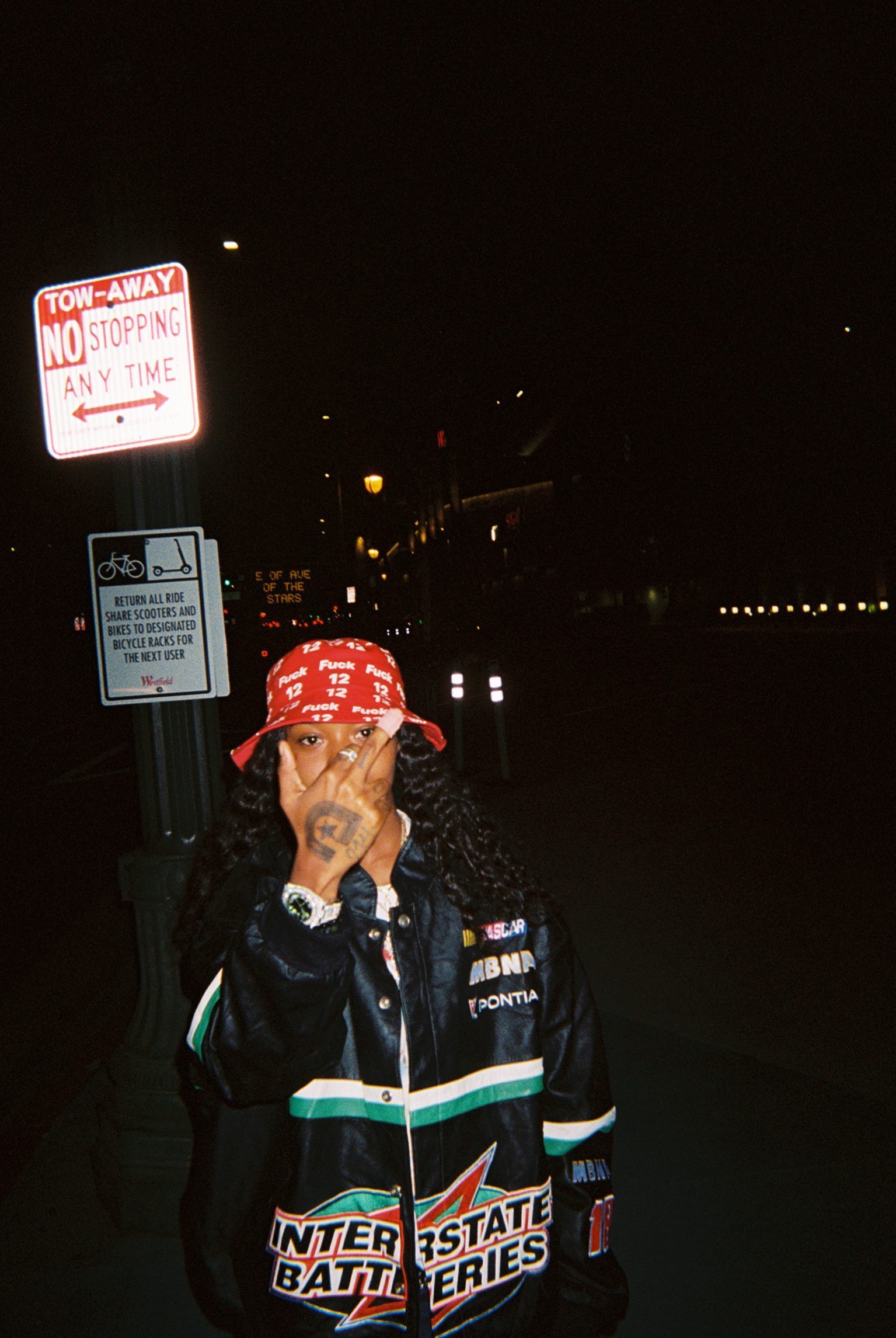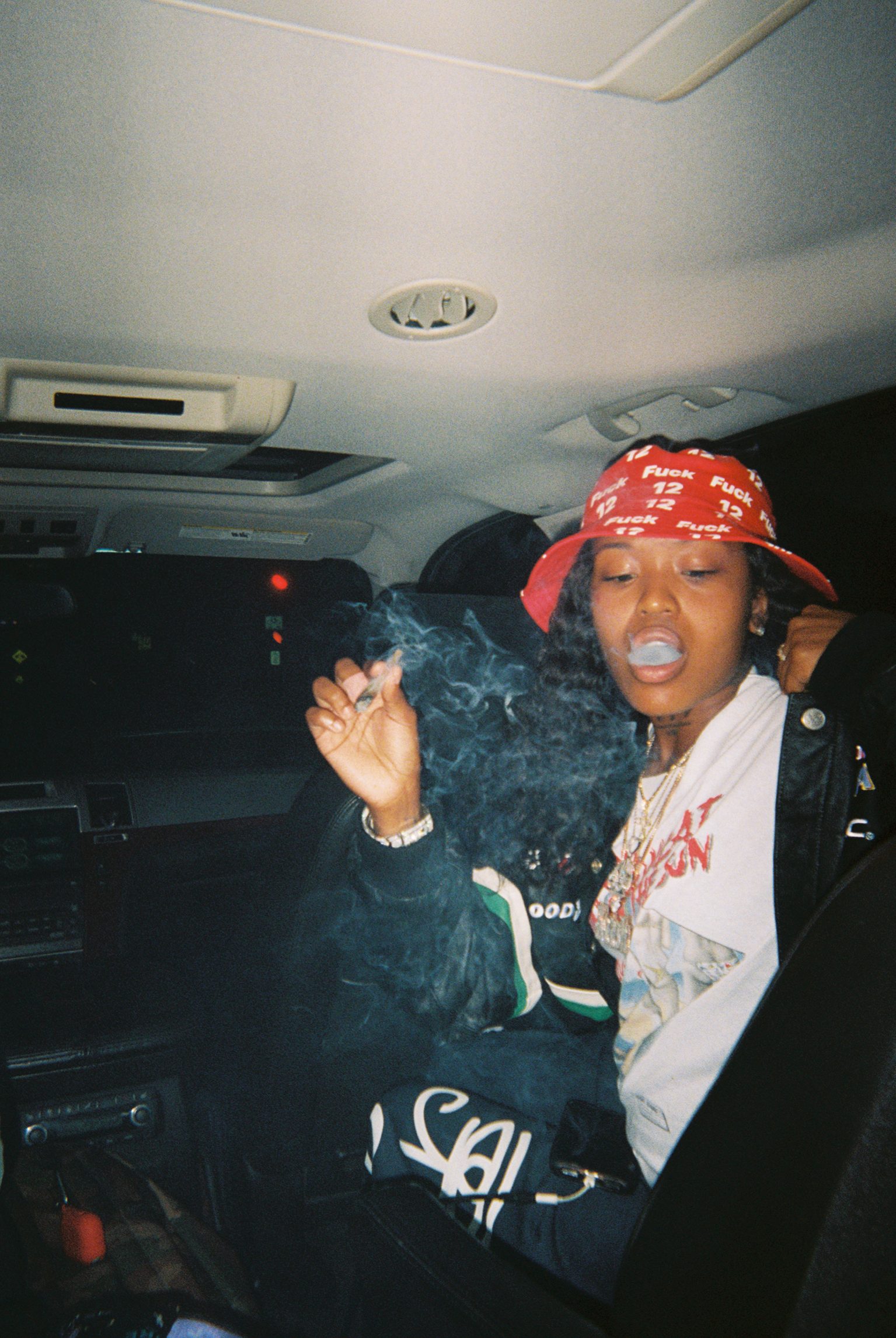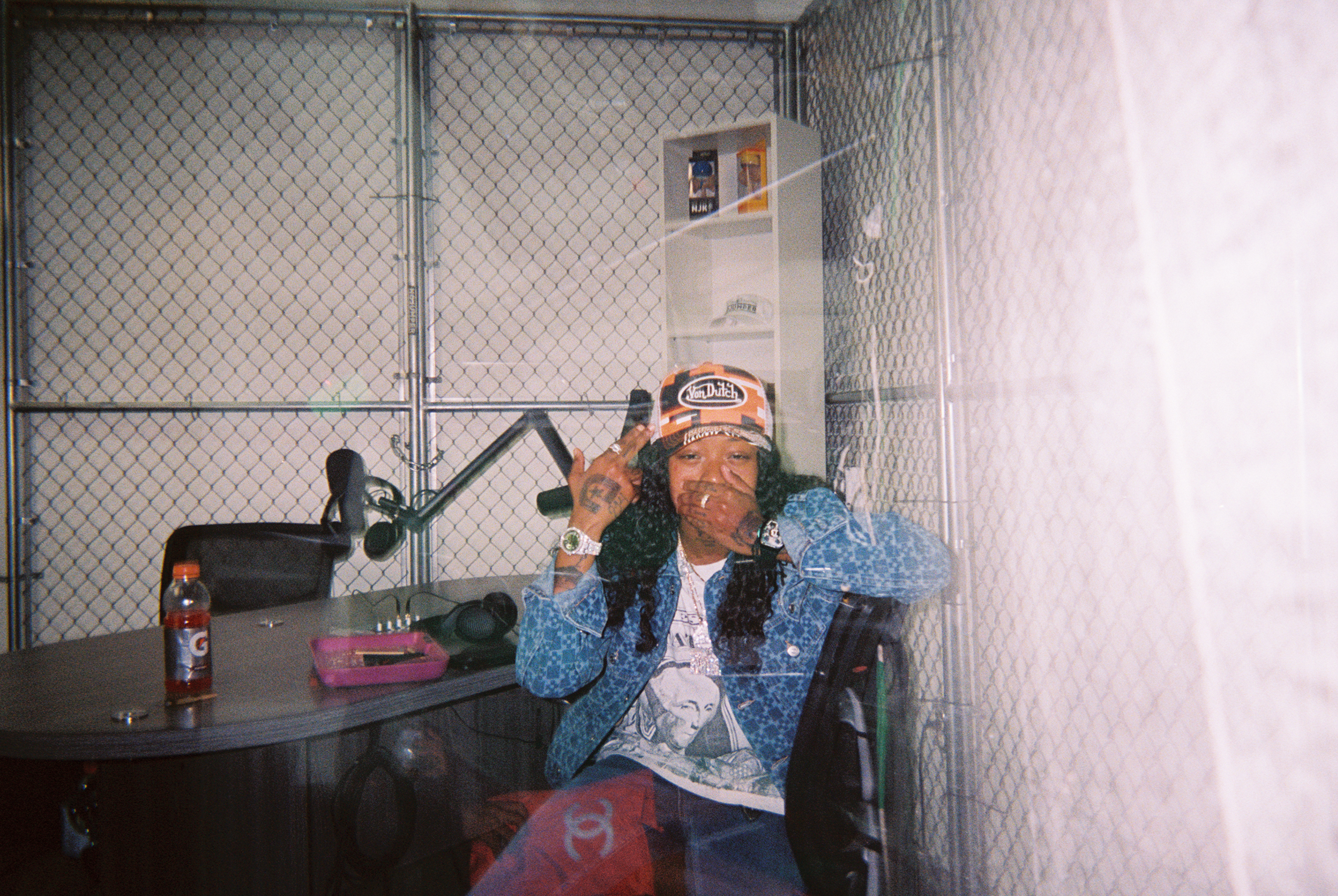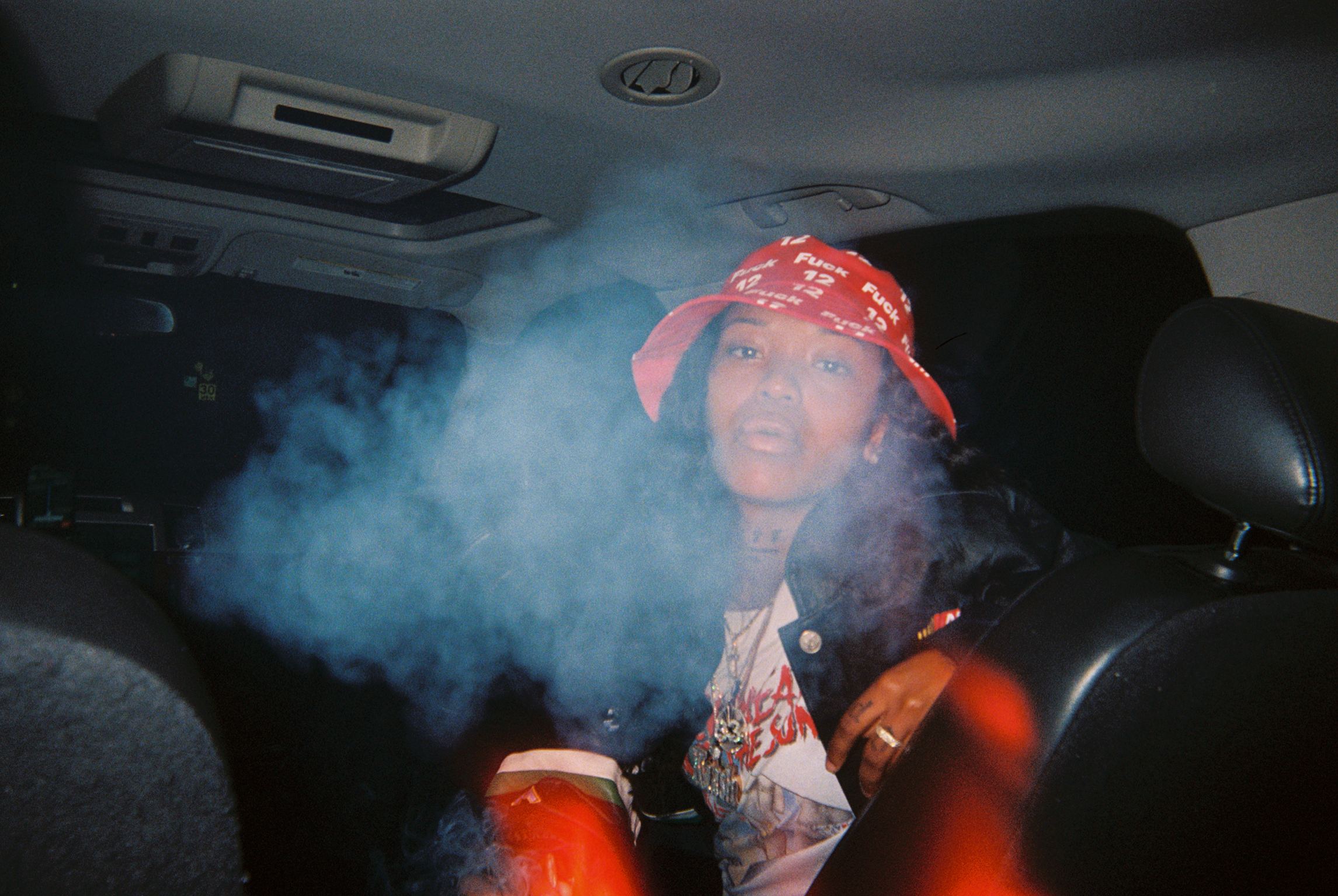
Kaash Paige knows a thing or two about having teenage fever. In fact, her debut full-length album Teenage Fever, which dropped on August 14, is all about the inner workings of this 19-year-old Dallas native’s adolescent mind as she explores mental health, heartbreak, sex, and the painful pleasure of brutal honesty. That would make the acronym of her name (Kill All Arrogance Stop Hatred) make sense, wouldn’t it?
With features from Don Toliver, SSGKobe, 42 Dugg, K Camp, and Isaiah Rashad on top of her poetry lyrical flow and melodic vocals, it’s no wonder how Teenage Fever became the #1 R&B album in the world via Apple Music in less than 24 hours following its release. The Def Jam signee knew she was a writer since she wrote poetry in high school, but once she started adding music and vulnerability to what would soon become soulful, sultry dormroom-bred bops, it was a wrap. Since Kaash’s official footprint into the music scene with her debut EP, Parked Car Convos, there’s no telling where the “Love Songs” songstress will be by the time she’s of legal age to buy a drink at the bar.
LADYGUNN spoke to Kaash Paige about her professional and creative growth as an artist since the release of Parked Car Convos, the importance of using her platform as an artist to address mental health, and the power of Generation Z when it comes to voting and social justice issues.
IF YOU COULD GIVE YOUNG KAASH A PIECE OF ADVICE ABOUT THE INDUSTRY, WHAT WOULD IT BE?
To not be so naive, you know? To always peep energy before you get into certain situations. Be more dedicated because this doesn’t happen for everyone. I’m still young, I’m only nineteen and I only got into the industry last year. I wish the 18-year-old me would’ve just [taken] more time to understand how the industry works and take more time to perfect my craft. Of course, I’m doing it now, but I wasn’t taking it as seriously. I’m more professional now than I was then.
WHEN DID YOU FIRST BECOME INTERESTED IN MUSIC? WHAT MOMENT IN TIME DID YOU KNOW THIS IS WHAT YOU WANTED TO DO?
I remember when I was a kid, I was very into music, but I wasn’t very consistent because I played sports. It was like my sophomore year [when] I started doing music. My parents got divorced so I couldn’t become completely consistent with it because I used to record at my dad’s and it was like, “alright, bet.” I let time pass by and my senior year [was] when I could actually branch off and go to these studios because my parents never actually let me go to the studio. A lot of stuff really happened for me last year, if that makes sense.
HOW DID YOUR UPBRINGING IN DALLAS INFLUENCE YOUR ARTISTRY AND PERSONAL STYLE?
Just the different creatives I was surrounding myself around. We had little local shows that would be at house parties or little dope venues like taco spots and stuff. Being in those environments and seeing different types of artists and – I don’t know, it was just weird. They had a lot of colorful lights and stuff; it was really just the Texas culture. Seeing that and being around that at a young age influenced me to be myself because they were being themselves.
HOW DOES IT FEEL BEING RECOGNIZED IN YOUR HOMETOWN AND HAVING YOUR OWN BILLBOARD?
It feels dope. Even yesterday, I was at Six Flags and it was just crazy to know how many people in the city know me. It just feels – I don’t know. All I could say is I’m full of joy and it’s dope to know everybody’s aware of you. It’s hard to answer questions like that because I don’t know what to say; you’re just happy. I’m happy every single time somebody’s like, “Oh my gosh, are you Kaash Paige?” or “can I take a picture with you?”.
A LOT OF ARTISTS RIGHT NOW ARE ALSO TALKING ABOUT THE WHOLE “SIGNING TO A LABEL” THING VERSUS STAYING INDEPENDENT. WHEN YOU SIGNED, WHAT MADE YOU DECIDE THIS WAS THE BEST MOVE FOR YOU AND YOUR CAREER?
That’s the feeling of “you’ll never get this type of opportunity again”. I understand when people want to be independent, but at the same time, everybody has their own path. I feel as if when signing to a label, there’s nothing wrong with it. The biggest artists are in messed up contracts and that’s the [stigma] that everyone goes through – the bad contract as soon as you sign [or] you’re signing your life away. Nah, my label loves me. We’re a team, we’re a family, and they’re making sure that everyone’s breaking me as an artist. I feel like what we’ve been doing is pretty dope. It’s like a powerhouse behind you and it pushes you to get the world more aware of you. I feel like when you’re independent, of course you have to work ten times harder for people to see your name and hear your music. For my team, it’s like a powerhouse to me like a robot.
OVERALL, HOW WOULD YOU SAY YOU’VE EVOLVED PROFESSIONALLY AND CREATIVELY SINCE YOUR DEBUT EP TO NOW, TEENAGE FEVER? HOW IS YOUR ALBUM A REFLECTION OF YOUR GROWTH AS AN ARTIST?
I remember last year I never wanted to listen to nobody. Everybody would be like, “this is dope” or “this is good for your look,” and I’m like, “nah, I don’t want to hear that. That’s corny to me.” It’s not corny; those types of opportunities can get you into so many doors that you never know, so I was blocking my own blessings. This year and with this album, I had to go through different situations of being jaded, fake friends and little business situations that left me a little bitter. I had to go through stuff like that because of course I’m young [and] I’m gonna have all these different emotions. Putting that into Teenage Fever, everybody was able to relate and when people are able to relate to you, it makes them draw more to your music.

WHAT WERE YOUR FAVORITE SONGS TO RECORD FROM TEENAGE FEVER? WHAT STORIES WERE YOU TELLING?
I think all of them were my favorite songs. You have to understand I recorded my whole project in a dorm room – same with Parked Car Convos. All of this was done in a dorm room so every single moment was an experience in a different time when I was making these songs. Some of these songs are even from the beginning of last year or the end of last year; some are through quarantine. It was just trying to put everything I felt amongst these nineteen years of living into a whole project.
WITH THE TITLE TEENAGE FEVER, IS THAT BECAUSE OF YOUR AGE BRACKET OR DOES IT GO DEEPER THAN THAT?
It’s because of my age bracket, but I honestly feel like anybody could have teenage fever, you know? Everybody has emotions. Whenever I made it, I was like, “this is my last year being nineteen, I’m about to turn twenty,” but I just wanted to go out with a bang explaining through instrumentation and without my lyrics everything that I went through, ups and downs, and even blessings.
SHIFTING A BIT TO TALKING ABOUT MENTAL HEALTH. YOUR MUSIC REALLY TOUCHES ON THE MISUNDERSTOOD AND THE MISCONSTRUED CONVERSATIONS OF DEPRESSION AND ANXIETY, ESPECIALLY FOR PEOPLE WHO ARE CLOSER TO YOUR AGE. HOW IMPORTANT IS IT FOR YOU TO ADDRESS THESE MENTAL HEALTH HARDSHIPS IN YOUR MUSIC?
Whenever you address that, it’s kind of like a stress reliever because you understand the problems that you have and for somebody else to listen to that, it’s like “ah, yes, I’m not alone anymore.” If you listen to my music, I’m talking about breakups, anxiety, suicide, anything – it’s like, “wow, they’ve been there before and they’re still here.” So what does that tell me about myself? I’m still here, I’m still blessed, still living. The world has so much to give and I have so much to give, so let me just try to figure out what I can do to help myself grow and find my needs to make me happy [and] my passion.

WHEN YOU DO EXPERIENCE DEPRESSION, ANXIETY OR NEGATIVE SELF-TALK, HOW DO YOU MANAGE OR OVERCOME IT?
I’m not gonna say it’s hard to not stay negative ‘cause it’s always your subconscious in the back of your head. I don’t know if you’ve seen stuff like this on TikTok when you’re driving on the road happy and then you want to turn the wheel and crash it. That’s your subconscious; you would never do it, but that’s what our brains do. Do I know why? No, our thoughts just do stuff like that sometimes. You just really [need to] stay grounded and know what you want out of life for yourself. Whenever I’m depressed or feel myself going into a hole, I surround myself with my friends and family; people that matter and make me feel good. When I have anxiety, I tend to leave everybody alone because the way my anxiety is, my anxiety makes me mad. I don’t know why. I have to go into my safe zone where I’m comfortable, relieve my own type of stress and just chill out by leaving the world alone.
WHEN YOU’RE WORKING ON YOUR MUSIC, WHAT’S YOUR CREATIVE PROCESS? DID IT CHANGE OVERTIME OR HAVE YOU ALWAYS HAD THE SAME CREATIVE HABITS?
They for sure changed over time. I used to write, write, write. I started off writing poetry, then I started writing hella songs. Then, it was like, “I feel like writing is taking up too much of my time,” and I used to be a very impatient person. I developed patience over time, but I felt if I kept jotting down this pencil on this notebook or putting my fingers to these [Apple] Notes, I’ll just keep overthinking everything. Every single line is not good enough and I hate that I’m so hard on myself. “This line about love sucks, so let me freestyle it,” I would just put on a beat, ask everybody in the room what they think about the song or the beat, they’d tell me what they think and I’d just put my headphones on and freestyle it. I have to freestyle everything so I won’t get into a hole of not knowing what to say or not knowing what direction I should take. If you play a beat or a song too long, it starts to get played out. I just don’t like to waste time.
HOW WOULD YOU DESCRIBE YOUR SOUND IN THREE WORDS, AND WHY THOSE THREE?
(Laughs) I was going to say “blunt” or “real,” one of those. “Vulnerable”; I’m blunt because I’m keeping it real in my tracks and I’m vulnerable because I’m letting you know how I feel. It’s always the player in me too, so how would I – “pimpin’”? (Laughs) I don’t know, it’s hard to even answer that because I have so many words that I could say, but I’m just trying to figure out the cool words.
IN A LOT OF YOUR INTERVIEWS, YOU DEEM YOURSELF AS A ROCKSTAR. WHAT WOULD YOU DEFINE AS A ROCKSTAR AND HOW DO YOU QUALIFY AS ONE?
A rockstar is carefree, “I am who I am and if you don’t like me, that’s you,” and it doesn’t matter. It’s all about me, what I care about and how happy I am. When I’m on stage or in my interviews, I’m just being myself; rockstars do what rockstars do. Especially in my music, you’re always hearing guitars. I love alternative rock music. I grew up off that [while] playing Guitar Hero; I love the strings of electric guitar and I love going wild and crazy. Being a young Black female, you don’t see a lot of that. Tina Turner was a rockstar in my opinion. Being able to show people you have a wild side to you – people love that.
WHEN YOU’RE NOT BEING A ROCKSTAR, WHAT DO YOU DO DURING YOUR FREE TIME AND HOW DO YOU MAINTAIN BALANCE?
I’m really a family-oriented person. Growing up, I never could be family-oriented as much because I felt very misunderstood, I was in school and I wasn’t seeing my family like that till I got home. When you get home, you’re already sleepy ‘cause when you wake up in the morning, you gotta go to school. Now that I have time to travel and stuff, I like to be around my family more and rely on them for inspiration for my music.
AS AN OPENLY BISEXUAL BLACK WOMAN IN HIP-HOP AND R&B, HOW IMPORTANT WAS IT TO BE OPEN ABOUT YOUR SEXUALITY?
I’m not gonna hold you, I just didn’t care. I grew up my whole life caring what other people thought about me and I feel like that damaged me as a person because why care about someone else’s opinion and not have your own voice? When it comes to sexuality or the way I want to live my life, it’s my world and I live in it.
WHAT’S THE IMPORTANCE OF LGBTQ+ REPRESENTATION IN THE MUSIC INDUSTRY?
There’s a lot of work to be done everywhere, especially in that community. Some people are still afraid to come out because of opinions, but like I said, you are who you are. Who gives a fuck? It doesn’t really matter. Live your life for you; nobody else.
HOW IMPORTANT IS IT FOR YOU TO USE YOUR PLATFORM AS A GEN-Z’R TO ENCOURAGE YOUR PEERS TO USE THEIR VOICE FOR SOCIAL JUSTICE ISSUES?
It’s more so about being educated, too, because not a lot of us know what’s going on in the world. We find out news on social media half of the time. You get on Twitter and you see a lot of posts about police brutality, killings, and you’re asking “what’s going on?”. With our generation, it’s more about becoming aware of what’s going on across the country, in other countries, and just being able to voice your opinion on anything without being afraid.
TO BRING THIS INTERVIEW FULL CIRCLE, IF YOUR YOUNGER SELF COULD SEE YOU RIGHT NOW, WHAT WOULD SHE TELL YOU ABOUT WHO YOU’VE BECOME?
She’d tell me that I came a long way. I used to talk way too much and be way too in-depth with everything I have going on. I’m still nineteen, I’m still learning, I’m still growing. 17-year-old, 18-year-old me was just a wild child, very into everything and how I am now, I’m very laid back, a free spirit and I mind my own business and take care of what needs to be done. I’m an unproblematic person and I feel like it should stay that way.

CONNECT WITH KAASH PAIGE
INSTAGRAM // SPOTIFY // TWITTER // TEENAGE FEVER
Photos / Luan Pham
Story / D’Shonda Brown (@SignedShonda)
